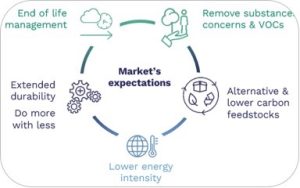More news
- Focus on the global coatings market: Global coatings market outlook
- Innovative coatings mitigate effects of deepening climate change
- View from the UK: Navigating chemical policy and sustainability
- Focus on adhesives: Unveiling unbreakable bonds – Testing redefines physical strengt...
- Focus on adhesives: Henkel and Covestro collaborate for sustainability of engineered wood ...

Richard Jenkins, Senior Vice President, Arkema, spoke to PPCJ about the challenges, trends and opportunities facing the coatings industry when it comes to the topic of sustainability
Q. What are the key areas of sustainability that Arkema is focusing on, in relation to the coatings industry?
A. Arkema is focused on enabling CO2 reduction down the value chain. This starts with our ambitious climate plan (scope 1,2, 3; SBTi validated), paving the way to net-zero by 2050.
Arkema innovates products and solutions following the eco-design principles by adressing key sustainability drivers across the value chain. We see through this approach that we can drive decarbonisation and further circularity in material design at several steps of the value chain. Moreover, developing more sustainable solutions goes beyond the materials themselves, it means also developing more sustainable usage such as cool surface coatings to improve building efficiency and reduce energy consumption, or solutions to improve EV battery performance (including new technologies such as high silicon Lithium ion, dry process and solid state) and more.

Q. What do you find to be the most challenging aspect/s when trying to make coatings products more environmentally friendly?
A. The challenge is how to help consumers see the value of sustainability, alongside performance and economics, in their purchase decision. This will create the demand to which the upstream materials industry can respond. Arkema is in a good position to participate in bringing these aspects together, and to help articulate the value and virtue of sustainability. In the past two years, Arkema has showcased multiple cooperative efforts with partners across the value chain.
Q. And likewise, what do you see as being the biggest opportunity/ies for sustainable chemistry within the coatings industry?
A. We are working closely with our customers and customers’ customers in the building and construction market, which represents as much as 40% of worldwide emissions, to identify solutions and promote more intelligent usage and design. It represents an area where we see the opportunity to have the highest impact. Country regulations as well as certification such as LEED (Leadership in energy & environmental design) are driving demand to reduce the embodied carbon in materials, as well as the operational carbon through an improvement of building efficiency.
With transportation being meaningful contributors to CO2 emissions, Arkema also partners to bring solutions in these applications. Arkema brings an offering that encompasses and enables many steps in the value chain for EV batteries. This is possible due to the breadth of Arkema technology: powder & UV cured resins, waterborne resins and additives. We are also implementing a transition approach (i.e., Mass Balance) to accelerate massification and define a more efficient investment pathway.
As another example, in May Arkema announced its partnership with the carrier ISMERT, part of the MGE Group, to address the challenge of reducing transportation emissions.
READ MORE:
PPG marks strong progress against 2030 sustainability targets with latest report
Q. How does Arkema adapt and respond to changing regulations and legislation surrounding the use of certain chemicals or raw materials?
A. Regulation and legislation are constantly evolving due to a wide range of factors – and can differ significantly from region to region. It is valuable to connect with partners to share trends and impressions. Arkema has a dedicated product stewardship department monitoring regulations to enable the R&D teams to anticipate needs and proactively develop solutions. The best solutions go beyond compliance thinking and into benefit thinking.
As a policy, all products developed from now will meet the definition of a sustainable solution as defined by our portefolio sustainability assessment program Archimedes. For example, Arkema has multiple ISCC+ certifications at coating materials production facilities worldwide, including sites in China, Europe and North America.
Q. Do you notice a difference in the attitude towards sustainability in different regions around the globe?
A. Yes, of course, which is natural for a world as diverse as ours. We also see the difference in approach by the governments. From our perspective, Europe is focused on decarbonisation for the building & construction industry, as it represents about a third of total worldwide emissions. The USA is taking an incentive-based approach domestically. China, for its domestic market, is focused on coatings that are healthier for the family (indoor air quality). India and China are looking beyond their borders to the export requirements and are aligning accordingly to the requirements in Europe and beyond.
Q. How does Arkema decide on which areas of sustainability to focus on? For example, you are promoting solutions for cool roofs; lower energy intensive solutions for coil coatings; bio-based solutions, etc – an incredibly varied range of offerings. How do you decide on which technologies or products to pursue?
A. We start with a value chain analysis to understand where energy consumption and CO2 generation are meaningful in terms of embedded or operational carbon. From there, we analyse market/regional needs, regulations, certifications and discuss with customers – and customers of customers – to understand the markets where these products are used. Then, we offer a toolbox-based approach to sustainable innovation that gives partners the tools they need to improve their carbon footprint.
While there is no one-size-fits-all solution, the elements are captured in the five sustainability drivers mentioned previously: removing substances of concern, reduced energy intensity, alternative raw materials, enhanced durability and circularity aspects.
READ MORE:
Q. Do you find it a challenge, to balance the performance of a product with its sustainable credentials? How has Arkema tackled this issue?
A. We see sustainability as a purpose, as a reason for doing business, and as a benefit to be included by design. Any sustainable solution needs to perform and be economically practical. The industry has been learning and evolving on this topic. Success comes when we solve for this objective and begin to scale solutions to mass production. Arkema has developed strategic connections with highly innovative suppliers and startups to support this scale-up process.
Q. Does Arkema have any specific sustainability goals/targets in place and what timelines/aims are you working towards?
A. One of our emblematic transformation programmes is our climate plan. We plan to align with the 1.5°C trajectory of the Paris agreement and have been approved by the non-profit organisation SBTi. Quantitatively, it means cutting our emissions by about 50% for our direct emission of Scope 1 and 2, but also for the Scope 3 emission of our supply chain. We are continually driving new innovation to meet this evolving context (regulations, climate objectives, consumer expectations).
Q. Looking to the future, what do you think will be the biggest trends or drivers in the field of sustainability?
A. We look at the five market drivers outlined earlier and in the above graphic to define a pathway toward sustainability. With these steps in place, we see the pragmatic implementation of technology and partnership for capital investments and new developments.
Upstream suppliers are focusing on decarbonisation, defossilisation, with Mass Balance as a transition option. An example of this is our recent ISCC+ certification at our monomer production facilities in Carling, France, Taixing, China and Clearlake, Texas (US), as well as progressively at all our waterborne, UVLED, high solid and powder resins sites worldwide. All future capital investments are viewed with CO2 reduction and renewable energy in mind.
Downstream manufacturers and end users target a more circular economy through recyclability, product durability, hazard removal and reduced energy consumption. All new development projects at Arkema will be evaluated with this in mind.
Arkema recently announced a new manufacturing process that integrates up to 40% post-consumer recycled PET resin content from end-of-life packaging products into its powder coating resins. This new technology will empower our customers and end markets to better respond to increasing societal expectations to preserve resources and reduce climate impact.







